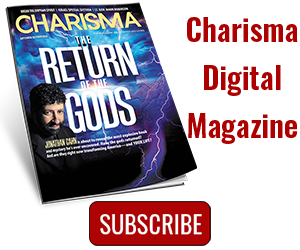
About a week ago, Christianity Today Editor-in-Chief Mark Galli wrote an op-ed calling for the removal of Donald Trump from his presidential office. Galli's editorial stirred up a frenzy on the internet—conservative evangelicals rebuking his stance, and the left-wing media praising him.
Yesterday, I wrote my "Strang Report" about my personal opinions on the piece. But today I want to share with you something I wrote in my last book, Trump Aftershock, that I believe speaks directly to what we're seeing today.
I interviewed Galli for Trump Aftershock in the spring of 2018, and I think you'll find the results quite interesting.
I invite you to read an excerpt from Trump Aftershock below:
With Donald Trump keeping so many promises involving issues most evangelicals believe are important, some would ask, "Why does a segment of the evangelical church identify as 'Never-Trumpers'?" Considering that only about 20% of evangelicals did not vote for him in 2016, I would have expected these individuals to come around to support Trump, as I did in 2016, after they began to see what the president has actually accomplished.
To understand this, I interviewed Mark Galli, editor-in-chief of Christianity Today magazine. Though Christianity Today did not support candidates from either party, one could tell by their editorials that they were not Trump fans. I learned that Galli didn't support him either when both of us were interviewed by The New York Times during the week Judge Roy Moore lost his election to the Senate. Times writer Laurie Goodstein interviewed me the day of the election and tried to get me to say that evangelicals were tarnishing their brand. According to Goodstein, by supporting someone so imperfect as Trump and his buddy, Roy Moore, we had betrayed our principles.
I've known and admired Galli for many years as he came up through the ranks at Christianity Today. Goodstein's lead said he didn't need to wait for the votes to be counted to publish an essay saying: "Whoever wins, there is already one loser: Christian faith." She quoted Galli as writing, "No one will believe a word we say, perhaps for a generation. Christianity's integrity is severely tarnished."
She added, "The sight of white evangelical voters in Alabama giving their overwhelming support to Roy S. Moore ... has deeply troubled many conservative Christians, who fear that association with the likes of Mr. Moore is giving their faith a bad name. The angst has grown so deep, Mr. Galli said, that he knows of 'many card-carrying evangelicals' who are ready to disavow the label."
The New York Times then quoted Ed Stetzer, executive director of the Billy Graham Center at Wheaton College, a prominent evangelical school in Illinois, as saying, "It grieves me. I don't want 'evangelical' to mean people who supported candidates with significant and credible accusations against them. If evangelical means that, it has serious ramifications for the work of Christians and churches."
As a reporter myself, I realized Goodstein had a story line and was looking for some juicy quotes to back it up. I wasn't about to give her the sound bites she wanted; but instead, I tried to explain that with the way the country has been headed the past half-century, we needed someone to be disruptive.
"I believe God answered our prayers in a way we didn't expect, for a person we didn't even necessarily like," she correctly quoted me as saying, identifying me as the "author of God and Donald Trump and founder of Charisma Media."
"Christians believe in redemption and forgiveness, so they're willing to give Donald Trump a chance," I went on to say. Then I added that support by born-again Christians cannot be taken for granted. "If he turns out to be a lecher like Bill Clinton," I said, "or dishonest in some kind of way that's proven, you'll see the support fade as quickly as it came." That was quoted fairly enough, but in our hour-long interview, I tried to explain that Jesus said that "not everyone who says Lord, Lord will enter into the kingdom of heaven," and there are some people who identify as Christians but don't accept the essential doctrines of the faith. I was simply posing the question whether or not the Never-Trumpers and the other Trump haters are actually believers at all.
During the interview, the writer never mentioned Mark Galli or Ed Stetzer. She interviewed me the day of the election and interviewed both of the others the day after. When the story appeared in print, Goodstein quoted Galli and Stetzer as having deep reservations about Judge Moore and Donald Trump, and quoted Galli as saying that the evangelical brand is "tarnished." She followed that by quoting me: "Mr. Strang said that those who talk about Mr. Trump tarnishing the evangelical brand 'are not really believers—they're not with us, anyway."
While I did say that, my words were taken out of context. I had posed the idea hypothetically about unnamed people. Yet my comment created a short-lived Twitter frenzy with people blasting me as saying anyone who didn't agree with me wasn't a believer. Worse than that, it made it look as if I had said Mark Galli and Ed Stetzer, both of whom I respect and consider friends, were nonbelievers. When I read the article online on Dec. 14, 2017, under the headline "Fallout for Evangelicals After a Chaotic Election," I was stunned. I immediately called both men and told them my words were quoted out of context and that I would never had said that Christian leaders were not believers because of political differences. Thankfully, both men accepted my explanation, and I learned to be cautious the next time I talk to a reporter for the New York Times.
Months later, when I interviewed Mark Galli for this book, I did so to try and understand the Never-Trumper mindset. Galli made it clear he has never been a Never-Trumper, per se, even though he did not vote for him and likely would not vote for him in 2020. He mentioned several of Trump's accomplishments—appointing Neil Gorsuch to the Supreme Court, defending religious liberty, bringing North Korea to the negotiating table and securing the release of three Korean Christians—acknowledging each of those things as important victories for Christians. Moving the U.S. embassy in Israel to Jerusalem was a bold move. He acknowledged that sometimes leaders make bold moves that everyone thinks are wrong but later turn out to be right.
"You can't fault Trump for not making bold moves," he said.
He also wanted to set the record straight about a few things from the New York Times article. For example, he didn't specifically say the evangelical brand was "tarnished." He told me, "I meant it this way—to people on the left, the evangelical support for Trump makes them respect evangelicals less. That's a reality. On the other hand, support for Trump has not tarnished the brand to all the conservatives who voted for Trump."
Where Galli and those who agree with him have a problem is what I now see as a fundamental difference in style. They consider Trump brash, blustering and a populist.
"There are different segments of American life that just do not like populism or the leaders of the populist movement," Galli told me. "They think they are dangerous ... just a few steps away from becoming a Hitler or a Stalin."
Instead, Galli said he prefers leadership to be understated—to speak softly and carry a big stick.
I asked him if he believed Trump's dalliance with a porn star a dozen years ago diminishes his obvious political success. He responded, "When he's dealing with Saudi Arabia or Korea, I [doubt] they're thinking once or twice about whether he had an affair with Stormy Daniels or not." But he went on to say that in the long run, we want our presidents to be good examples of our ideals—people our kids and grandkids can look up to—and he doesn't feel Trump does that. The real conundrum, he said, is how can so many evangelicals support him when he has had such a checkered past.
"For the longest time, evangelicals have said the character of our leaders is one of the most important aspects of ... leadership. And they have now taken a stance and said, 'That's not as important as his policies that are carried out.' ... Conservative evangelicals have taken some time to get respect in the public square. And they want to be seen as legitimate players int eh world of culture and politics ... along comes Donald Trump, and breaks all of those rules. ... From the perspective of our international reputation," Galli said emphatically, "Trump is an embarrassment to the country."
While I respect Mark Galli and honor his opinion, we don't agree on a lot of things, including theological doctrines. But we can agree that the most important thing for Christians on both the left and the right is that there is a higher kingdom.
I encourage you to read Trump Aftershock, which I wrote in 2018. It is written a little more to a secular audience as my way of explaining what was happening in Trump's first two years—both his major accomplishments and also how the left went crazy after he was elected (and how much of the opposition was organized and funded by "billionaire radicals" such as George Soros). Amazon has marked down the price, so that is a good place to buy the book.
Also, check out my new podcast, God, Trump and the 2020 Election in which I read this excerpt about Mark Galli and then give some more behind-the-scenes commentary on the current cultural and spiritual environment.
My new book, God, Trump and the 2020 Election, is written to persuade evangelicals and other conservatives why Trump must win and what's at stake for Christians if he loses. The book releases Jan. 14, 2020, but if you order it before that date on GodTrump2020.com, we will send you the audio version of my three books as well as a subscription to Charisma. It has a retail value of $90 and is our way to encourage pre-sales, which are important if a book is going to take off. I hope you'll take advantage of this special offer and post this on social media to encourage others to take advantage of this special offer too.
Listen to today's podcast episode by clicking here.
To contact us or to submit an article, click here.
Get Charisma's best content delivered right to your inbox! Never miss a big news story again. Click here to subscribe to the Charisma News newsletter.





